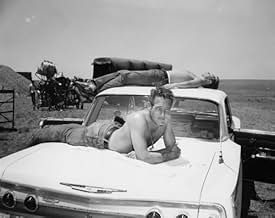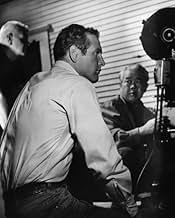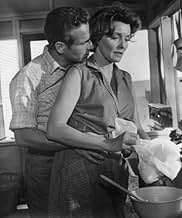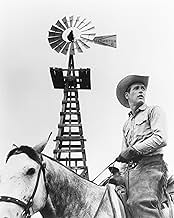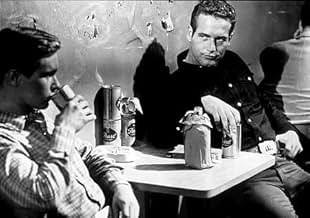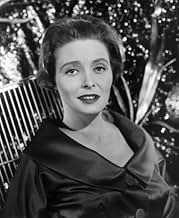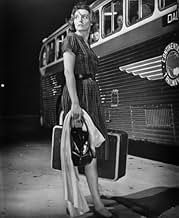Der ehrliche und fleißige texanische Rancher Homer Bannon hat einen Konflikt mit seinem skrupellosen, egoistischen, arroganten und egoistischen Sohn Hud, der in den Alkoholismus versank, nac... Alles lesenDer ehrliche und fleißige texanische Rancher Homer Bannon hat einen Konflikt mit seinem skrupellosen, egoistischen, arroganten und egoistischen Sohn Hud, der in den Alkoholismus versank, nachdem er seinen Bruder versehentlich bei einem Autounfall getötet hatte.Der ehrliche und fleißige texanische Rancher Homer Bannon hat einen Konflikt mit seinem skrupellosen, egoistischen, arroganten und egoistischen Sohn Hud, der in den Alkoholismus versank, nachdem er seinen Bruder versehentlich bei einem Autounfall getötet hatte.
- Regie
- Drehbuch
- Hauptbesetzung
- 3 Oscars gewonnen
- 17 Gewinne & 17 Nominierungen insgesamt
- Lonnie Bannon
- (as Brandon de Wilde)
- Myra
- (as Sharon Hillyer)
- Proprietor Sweeping Glass
- (Nicht genannt)
Empfohlene Bewertungen
**** (out of 4)
One of the bleakest films ever made, HUD centers on the title character played by Paul Newman who is about as ruthless as one can be. He cares for very little in this world and everything he does love is usually something bad. His father (Melvyn Douglas) has hated him for some time now but after their cattle grows sick they begin to butt heads.
HUD certainly isn't a very cheerful film and it's one of the darkest and in reality sadness movies ever made. While it's not always easy to watch there's no denying its impact plus the fact that it contains three of the greatest performances that you're ever going to see. HUD works on many levels but it's strength is certainly the performances as well as its honest character study of someone most people will find cool but when you get pass all the smoke you see a rather ugly human being.
The screenplay itself is extremely laid back and in fact the film is pretty quiet. There's not too much screaming or long speeches but instead there's just a very realistic tone that comes across quite natural and real. I think most people will be able to look at these main four characters and either be one of them are know someone like them. There's the young cool guy who hurts everything that he comes into contact with. There's the older wise man who stands by his morals. There's a broken house maid who is probably hiding some sadness. Then there's the young nephew who looks up to Hud not knowing or understanding his type of character.
Then, there are the terrific performances, which are among the best you'll ever see. Newman never had an issue playing cool but he always made it look so easy. He brings that quality to Hud but there's also that underlying dirty and dangerous part. There's just a certainly coldness that Newman brings to the character, which we never saw from him in his other roles. Douglas rightfully won the Best Supporting Actor Oscar for his deep and very sincere performance. Neal is a great big ball of sadness and her deep eyes just say so much without her having to speak a word. Even Brandon De Wilde is very impressive in his role and especially when you consider the major talent he was acting against.
HUD also features a terrific and haunting music score and the Oscar-winning cinematography perfectly captures the dusty dirt roads. The film manages to keep getting better with time as its messages are perhaps more true today than when the film was originally released.
Hud lives with his elderly father Homer (a wonderfully understated performance by Melvyn Douglas) and nephew Lonnie. Their small, struggling ranch serves not only as a livelihood, but also the source of Homer's ethical values. Another main character is Alma, the attractive housekeeper and cook. For all four of them it's a hard life, but a worthwhile life, at least as Homer sees it. Hud sees it differently. But then Hud is a product of modern times, with differing values from those of Homer and his generation. When a crisis occurs that puts their ranch in jeopardy, these differing values clash, resulting in tension between Hud and his father.
Hud's ongoing rebellion, rooted in heredity and environment, takes the form of booze, brawls, women, and anger. Hud is a heel, but a sympathetic heel. We understand his frustrations. Larry McMurtry's story presents a naturalistic interpretation of human character. Hud is constrained by forces over which he has no control. For him, like for many of us, freedom of choice is mostly an illusion. The morality of absolutes, as expressed by his father, does not work in Hud's favor.
But there's a fifth character in this morality tale ... the land. The bleak, desolate plains with its buzzards, ubiquitous dust, and lonesome vistas can depress the most optimistic spirit. In this film, the monochrome canvas accentuated by James Wong Howe's use of single source lighting makes the natural environment seem appropriately oppressive. And the film's sounds amplify the gritty realism of this unforgiving land.
I have a couple of minor criticisms. The screenplay puts too much emphasis on Alma, given that she is the housekeeper. Second, there's not enough music or humor. Others will disagree, but I would have preferred a more prominent role for the mournful sounds of Hank Williams type music, a la "The Last Picture Show".
Interestingly, Hud's comment on life is the same in meaning as the words spoken years later by a real-life nihilistic antihero, who said: "No one here gets out alive". While we think we know what happened to the real-life antihero, we don't know what became of Hud. Perhaps someday someone will make a credible sequel. Then they can add more music. Imagine the mood evoked by the sight of Hud riding off into the Texas sunset, to the sounds of "Riders On The Storm".
The vast, desolate "Lone Star" landscape has often inspired potent Hollywood screen-writing (witness "Giant," and "The Last Picture Show"). 1963's "Hud" is no exception. The story focuses around a bored, aimless, arrogant ne'er-do-well whose utter contempt for humanity threatens to denigrate and destroy all those exposed to it. Thrust in a dusty, dried-up, decaying Texas cattle town (awesomely photographed in black-and-white by Oscar-winning cinematographer James Wong Howe), the story bears down assertively on its straightforward themes of nihilistic youth and misguided hero worship.
Paul Newman was awarded an Oscar - but not for "Hud." He took home the award much later for his performance in 1987's "The Color of Money" but for me it was a restitutive pat on the back for his probing, higher-calibre work here in "Hud," among others. Newman gives an assured, excitingly reckless performance, the creme of the crop of earlier, jaunty perfs. All swagger and bluff, reeking with cocky sexuality, Hud Bannon is the personification of cool, callous cynicism at its most reprehensible...and alluring. The world is this cowboy stud's oyster. He takes what he wants, whenever he wants it - whether its coveting his father's land or coveting another man's wife, whether its peddling sick cattle on others or peddling his ethics on a susceptive boy - it's all at the core of a dangerously irresponsible life's dogma. A loser's warped vision of winning. It was a risky star performance for Newman as Hud has no redeeming qualities whatsoever, but the actor plays out his acting cards brilliantly and winds up with a royal flush.
Newman is bolstered by a choice cast. Dusky-voiced Patricia Neal, whose looks had begun to harden by this time, is fascinating as the forlorn, slovenly housekeeper Alma who has her careworn hands full just keeping the lustful, roving Hud in line. Hud (and the audience) is perked by her stifled but not yet snuffed out sensuality, as she wisely avoids the obvious come-ons tossed her way. Making relative peace with her lonely, desultory existence, Alma has overcome a difficult past and find a sense of being as the makeshift homemaker to an aging rancher/widower (Melvyn Douglas) while tending to his impressionable grandson (Brandon de Wilde), instilling in the boy some good old-fashioned sense and motherly attention when necessary. Neal is top-notch especially in her final scenes and quite deserved her Oscar.
Oscar-winning Douglas is superb as Hud's upstanding, uncompromising father, a cattle man in the twilight of his years. Chocked full of conventional wisdom and righteous indignation, the prideful old-timer may or may not have contributed to his son's acute moral letdown, having given up on him as a "bad seed" long ago. Their confrontational scenes are pocked with harsh accusations and bitter conflict - never to be resolved. De Wilde, in a coming-of-age extension of his memorable "Shane" role, again portrays the embodiment of idolizing youth as the teenage Lon. Drawn to the brawling, good-looking "outer package" of his older Uncle Hud, deWilde is touching as his character gradually wises up to the realization that this superficial "package" is damaged goods, while those nearest and dearest to him fall by the waste side.
A near-classic to be sure. The performances alone make this a not-to-be-missed item.
Melvyn Douglas is a truly under-appreciated American acting genius whose career spanned over 5 decades. His range is tremendous. This is the same honey-tongued actor who is the perfect comic foil to Garbo's Ninotchka in the '30's (In fact, he is one of her only REPEAT leading men!) And his bluster-filled performance in I Never Sang for My Father (with another modern great, Gene Hackman) is also out of this world! Other commentators have addressed Hud's multi-faceted story and the incredible B&W cinematography. All wonderful - but the next time you watch this true American classic, focus on Douglas' Oscar-winning performance. You will be amazed! (And remind yourself of some of the early roles in romantic comedies - Ninotchka, That Uncertain Feeling, This Thing Called Love or Mr. Blandings Builds His Dream House - this same actor performed so well.)
Wusstest du schon
- WissenswertesPatricia Neal was particularly proud of one unscripted moment that made it into the film. While talking to Hud about her failed marriage, a huge horsefly flew onto the set. Just as she says she's "done with that cold-blooded bastard," she zaps the fly with a dish towel. Martin Ritt loved it and printed the take.
- PatzerIn the first scene, you can see the cameramen and tripod of the cameras in the window of the store.
- Zitate
Homer Bannon: Lonnie, little by little the look of the country changes because of the men we admire. You're just going to have to make up your own mind one day about what's right and what's wrong.
- VerbindungenFeatured in The 40th Annual Academy Awards (1968)
- SoundtracksThe Great Titanic (It Was Sad When That Great Ship Went Down)
(uncredited) (ca 1915)
American folk song
Sung a cappella by Paul Newman and Brandon De Wilde
Top-Auswahl
- How long is Hud?Powered by Alexa
Details
Box Office
- Budget
- 2.500.000 $ (geschätzt)
- Laufzeit1 Stunde 52 Minuten
- Farbe
- Seitenverhältnis
- 2.39 : 1
Zu dieser Seite beitragen



